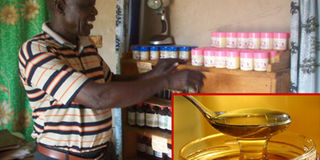Sweet returns of beekeeping

Ibawi displays some of the bee products. Inset is a bottle of processed packed honey ready for consumption. PHOTOS BY MARTIN OKUDI and net
What many farmers look at as dry land is very fertile land to Michael Ibawi. Martin Okudi and Felix Warom share his beekeeping success story.
The simile “As busy as a bee” takes on a whole new meaning when one visits 68-year-old army veteran, Michael Ibawi of Moyo who served in Uganda army in the 1960s. Much as many farmers have ignored beekeeping in Moyo and look at it as an enterprise with little income, the story is different for Mr Ibawi, who is reaping big from beekeeping in Metu Sub-county.
It was in 1989 during the return of Ugandan refugees from South Sudan that Mr Ibawi thought it wise to venture into bee keeping. As the exiles were settling in, life was difficult due to food scarcity in the district and countless people relied on relief support.
“I was digging in my garden when I saw a local beehive hidden in the middle of thorny trees. I later harvested the honey because I was hungry and then took it on as an enterprise. From that time, I carried the local beehive and placed it in a proper location with two others.It was the start of my fortune,” Ibawi says.
In 1992 Mr Ibawi was trained as a model farmer to harvest honey, which he says, has boosted his effort. Like any other farmer, he is asking for price protection.
Currently in a year, he gets over 240litres of honey out of the 70 beehives he has. He normally harvests the honey between March and April yearly. In Moyo, a 20litre jerrican of honey is sold at Shs80,000 and a litre is Shs12,000. In a year, he earns more than Shs2.8m.
He encounters problems of bush burning, prolonged dry spells and deforestation which is rampant in the district. To minimise the problems and realise more yields, Ibawi says, “I have resorted to planting flowering crops like simsim, cassava, maize and other fruits near the bee hives for better outcome.”
He sells a variety of bee products like pure honey, and propolise ointment, wax cake propolise tincture and honey wine. He supplies his products to restaurants. He has now started a private business; Moyo Bee Product located on Moyo-Arua road.
He won a certificate of appreciation in the honey production and processing category during the recent celebration to mark the World Food Day held in Yumbe district.
The district production coordinator, Mr Alabi Ajavu, said over 500 bee keepers have benefitted from various interventions in form of demonstration and setting up Moyo Bee Keepers Association to oversee the activities of the bee keepers.
Unlike the previous years where honey was used traditionally, currently many hive products are available in the district, Ajavu said. Propolise ointment for instance has medicinal value and is known for treating skin diseases. Actually the business is a blessing for his retirement.
He said the quality of honey in the district is good but sometimes it is contaminated by wrong methods of harvesting (traditional). “Some people mix honey with boiled water so we have resorted to testing all bee products,” he said.
Bee keeping is Ibrawi’s main source of livelihood. He has been able to feed his family and educate his children.




